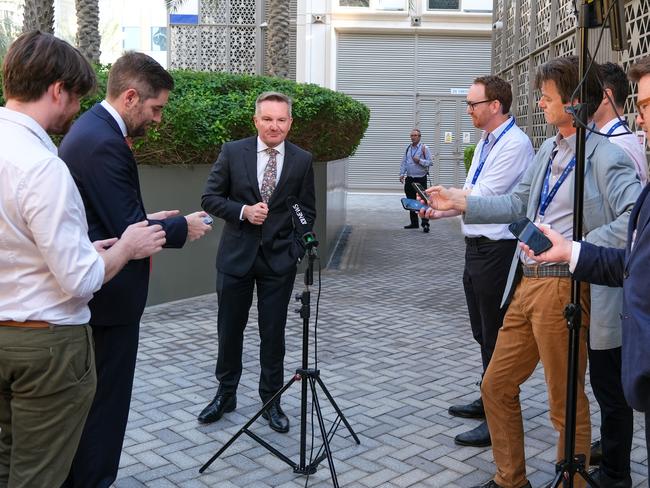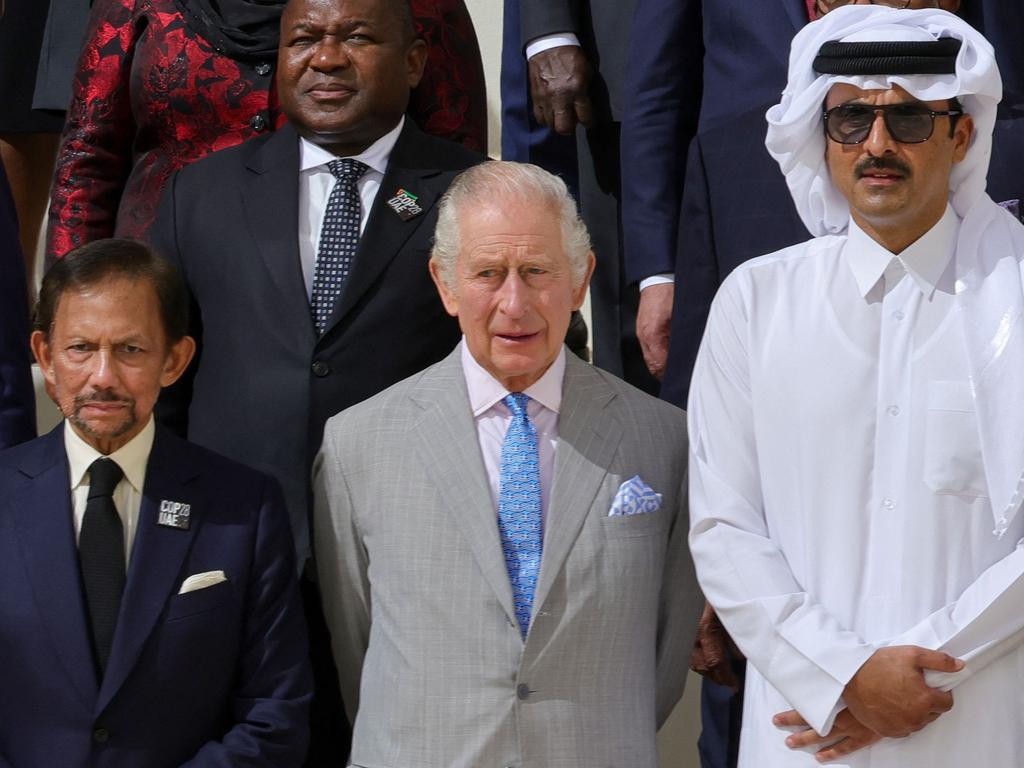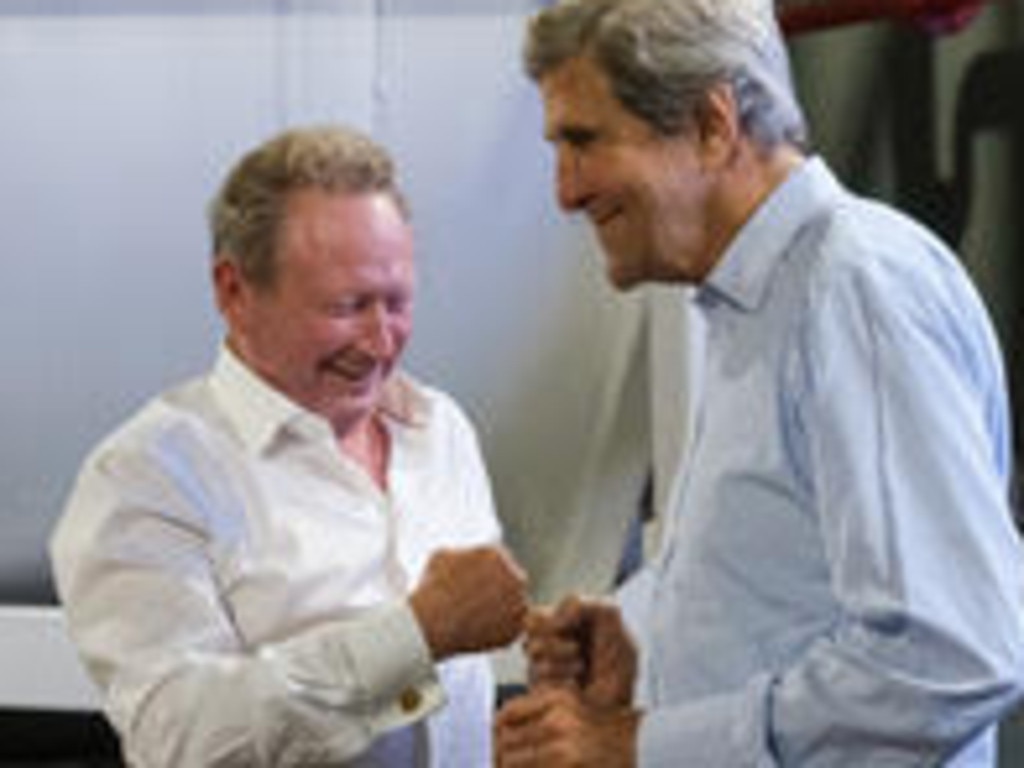Australia’s climate minister Chris Bowen tells COP 28 more public and private funding needed for warming limit
The Climate Change Minister says more effort is needed to change the world’s ‘dangerous course’ on global warming and more money to assist vulnerable nations.

Chris Bowen has told the UN climate meeting COP 28 in Dubai that Australia is at the “beginning, not the end” of becoming a global renewable superpower, demanding more money from public and private sectors to help vulnerable nations as the world “on a dangerous climate course”.
Mr Bowen, the Minister for Climate Change and Energy, said that Australia had agreed with Pacific neighbours last month to “an agreed transition away from oil, coal and gas” to achieve the “1.5-degree pathway” limiting warming to 1.5C above pre-industrial levels, and to have fossil fuels peak in the “near term”.
At the time of that agreement, Australia and New Zealand had diluted the final wording to “aspire” to such a transition away from the fossil fuels, but during the week Mr Bowen has indicated he may be pushing for stronger language in Dubai – as urged by many of the vulnerable nations – for a phase-down or phase-out of both fossil fuels and various subsidies of the fossil fuel industry.
Mr Bowen said that while Australia had doubled renewable energy in the east coast market, “making more progress in 12 months than in the last 10 years”, he added the country was “not yet satisfied”.
He told a largely empty room – with many delegates having various meetings elsewhere over lunch: “We have so much more to do, we are at the beginning, not the end. The world is not how saw it in 1992, we have to find the means to support those who need most, with more support from public and private.’’
He added the world was on a dangerous course: “We are not on track to meet the 1.5 (global warming target).’’
Mr Bowen told how his electorate in western Sydney was today facing a punishing 42 degree temperature.
Mr Bowen’s appearance came after thunderous demands that follow a similar theme at each COP: that vulnerable and developing countries on the frontline of more devastating and intense weather events want money, financing, and rapid decarbonisation action by developed nations.
Many countries provided stark warnings: “The clock ticks”, “the world is on the brink” or “sounded the alarm”.
Nigeria’s Minister of Environment Balarabe Abbas Lawal said: “Our efforts have been inadequate, too slow and none too wise given he severity of what we face”.
He added: “the powerful do what they wish, the poor do what they must.”
John Silk, the Foreign Minister of the Marshall Islands, said “despite our best efforts we are far, far off track, we cannot pretend otherwise. With current policies on track for 2.5 future [warming of 2.5C], we cannot adapt for temperature rise that high. The loss and damager will be intolerable, it will be our death sentence and we will not go silently to our watery graves.’’
Dominica’s minister Cozier Frederick said he was highly sceptical about the promises from developed countries.
He said: “Despite clear indications we are heading to irreversible impacts, countries are failing to limit emissions to acceptable levels and who pays the price? Countries like my own which contributes least to global warming.’’
Vanuatu’s Environment, Energy and Climate Change Adaptation Minister Ralph Regenvanu said his country faced an existential threat and called for more targeted and bespoke funding.
COP 28 refers to the 28th meeting of the Conference of the Parties to the UN Framework Convention on Climate Change.
Nuclear ‘part of balanced mix of energy’
Opposition climate spokesman Ted O’Brien said a Liberal-Coalition government would sign up to a COP nuclear pledge in their first year in office and consider nuclear “as part of a balanced mix of energy”.
Mr O’Brien said the Albanese-government had already been “mugged by reality” when it came to their 82 percent renewables pledge resulting in prices going up and the grid being unreliable.
“We need realism in this debate and embrace all technologies that will abate fossil fuels,’’ he told reporters after speaking at a Coalition for Conservation event hosted by the World Nuclear Industry on the sideline of the COP28 in Dubai.
Mr O’Brien spoke about the need for Australia to be opened-minded and consider all options, including nuclear, using each energy for their strengths so the system is complementary and works together to decarbonise.
He said the Liberal party under Peter Dutton had been investigating nuclear options – from small scale nuclear reactors to larger models – and revealed the experts had told him that siting a new nuclear facility on an existing brownfield site such as an old power station would be cost efficient. However he conceded that all of those questions, from the who, what, where, when and how, were yet to be determined.
“We want to keep those lights on and the prices down,’’ he said.
“There is no doubt under Labor we are seeing a race to the exit by our base load power stations and that is causing a risk.
“The more it intervenes the gas market stalls investment and it also becomes a problem, renewable investment is at an all time low under this Labour government. So there is no doubt we care creating problem after problem because we have an ideologically-driven policy.
“The evidence is that nuclear energy is one of fastest ways of decarbonising, and nobody is suggesting any technology is the silver bullet but nuclear energy needs to be considered as part of a balanced mix of energy.
He added: “If we are honest and learn lessons from overseas, we have to concede countries who have decarbonised their grid at speed have done so with help from zero emissions nuclear energy, and the question for Australia is should we too be going down that path?”
Mr O’Brien said the Liberals would not follow Labour’s renewables pledge because the plan was unrealistic and other energy options needed to be considered as well.
“Investment in renewables has stalled under this government, we have to support all technologies, we don’t pit against each other,’’ he said.
“I don’t support 82 percent by 2030, it is unrealistic, they haven’t got Treasury or the department to model it (for costs) and the evidence says it has already failed.”
Mr O’Brien said any consideration by Chris Bowen, the minister for climate who is chairing an umbrella group of like minded countries to formulate a COP28 plan with ‘strong” language regarding the phase out or phase down of fossil fuels and subsidies, would be misjudged.
“If Labor starts talking about the phase out of fossil fuels I assume their first action will restore the $250m ripped out of the budget for carbon capture and storage,’’ he said.
“At the end of the day right now we do need coal and gas in our system, we need to clean it up and abate it.”








To join the conversation, please log in. Don't have an account? Register
Join the conversation, you are commenting as Logout